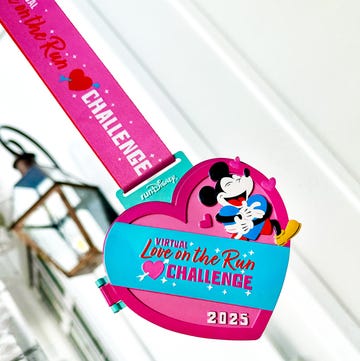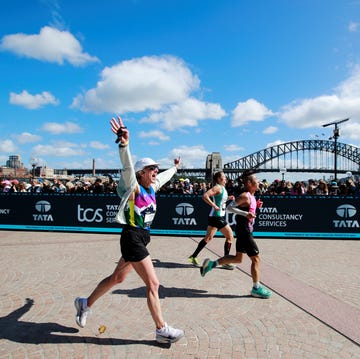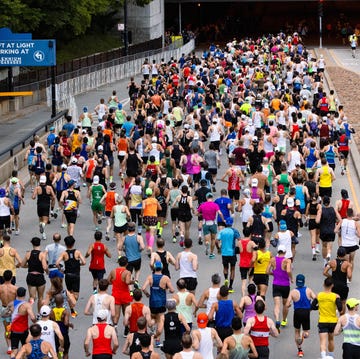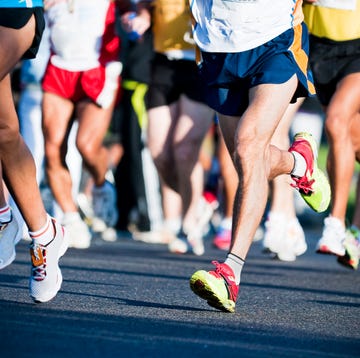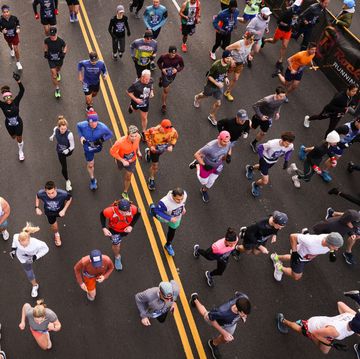Dennis Kimetto's world record sub-2:03 marathon in Berlin on Sunday was received around the world with a curious mix of hooray and ho-hum. There was the thrill of seeing the minutes on the world record digital clock click one figure closer to 2:00. But world record fervor seemed somehow muted, tempered by the sense that it has become an almost routine annual occurrence. A marathon world record by a Kenyan in Berlin? Turn the heat on, it must be the end of September.
No disrespect: Kimetto's was a phenomenal performance, a display of precise pace judgment (halves of 61:45 and 61:12) and courageous execution. It was a privilege to watch such dazzling, determined running even on screen. It was beyond question the result of supreme natural talent developed to its full extent by skilful and rigorous training. But a landmark? An epoch-marker? Or another notch on race director Mark Milde's belt? He too is a record-breaker extraordinary: The last six male world marathon records have been run at Berlin.
The Berlin Marathon was founded in 1974 by Milde's father, Horst, a runner who by upbringing and trade was a baker, running a family business that went back several generations. His son grew up surrounded by impeccable German baking, and carried those standards into the marathon when Horst passed the leadership to him ten years ago.
There's no way now to doubt the efficacy of the Milde/Berlin mix of ingredients: fast flat course, plus usually perfect weather conditions, plus super-efficient organization, plus carefully selected elite runners, plus huge incentive payments, plus lots and lots and lots of pacemakers. The production of world records from the Berlin oven has become the ultimate in the professionalization of running. But that may be why they don't generate the memorable magic of some long-ago barrier-breaking marathon moments.
When the news broke in 1967 that an unknown, big, clumsy-looking Australian called Derek Clayton had run a marathon under 2:10, every runner in the world felt the shock of sudden rapture, knowing that overnight their sport had changed; the top of the mountain we were all climbing had got much higher. When Grete Waitz broke 2:30 in 1979, it meant women had fully arrived in running, and had produced their first true elite. When Paula Radcliffe ran 2:17 and then 2:15 in 2002 and 2003, the whole world revised its view of women's physical and sporting capability. When, in 1952, Jim Peters ran the first marathon faster than 2:25 and only a year later broke 2:20, a world struggling to recover from destructive war could believe again in constructive progress through dedicated work, and the peaceful betterment of human potential. (See the charts below for a fuller list of barrier breakers in marathon history.)
Kimetto's moment doesn't join that super-league of marathon history. After next year's Berlin, it may have faded as much as Patrick (who?) Makau's 2011 Berlin world record has passed from memory. Its greatest significance may be the probably misleading one that it has made 2:00 seem to be a lot closer. Such a busy buzz of anticipation can only be good for the sport of running, but without being grouchy, it needs to be said at this Kimetto moment that his 4:41.5 pace for 26.2 miles is really not so very close to 4:35 pace, not for those who know what such a pace feels like, not at marathon distance. Road runners at any level know how hard it is to run 6 seconds per mile faster. Track runners know how big a step 1.5 seconds a lap is even for twelve laps, or 25. Try it for 105 laps, cutting from an already peak pace.
The figures are misleading. A sub-2:03 marathon is nothing like as close to 1:59:59 as a sub-4:03 mile was to 3:59.9. By all means believe and hope. Kimetto has (irrefutably) brought sub-2:00 closer. But don't hold your breath.
Shalane Flanagan's run at Berlin – so strong, so brave, so good but not quite great – raises two issues. One is that Kimetto ran negative splits and Flanagan very conspicuously didn't. She and her coach have already commented on what that means, so I won't labor it.
The other is the question that has been floating around for ten years: Why aren’t women's marathon performances following the relentless upward movement of the men's, but still mostly drifting in the mid 2:20s? Ahead of Flanagan's 2:21:14 in third place, Tirfi Tsegaye won Berlin, in perfect conditions and a well-paced race, in 2:20:18. Since Naoki Takahashi was the first woman to run under 2:20 in 2001, only 16 more women have joined her (not counting the drug-banned Liliya Shobukhova), barely one a year. In that same period of 13 years, more than 50 men have run faster than the 2:05:38 world record that Khalid Khannouchi set that year. Top women's marathons are still often won in the 2:22-2:25 range, which historically is 1980s territory, back to Waitz and Joan Benoit Samuelson. A 1980s men's time of 2:08-2:09 is only marginally professional these days in most big races.
Did Paula Radcliffe, with her 2:15:25 in 2003, raise the bar too high? Yet runners are not a breed prone to being deterred by challenge.
Do the women lack aggressive front runners? Sometimes, but not when Flanagan's around. And Mary Keitany and Buzunesh Deba are no first-half slouches, either.
Is it a matter of the combined energy that comes from numbers, with more men than women in the second tier, challenging to break through? Maybe, though new top talent seems to keep coming out of Ethiopia and Kenya as fast as with the men.
Whatever the reasons, the women's podium is still relatively available. The time is right for Flanagan (and Kara Goucher, now she seems to have recovered from injury). In her post-race interviews in Berlin, Flanagan was not playing disappointed. She was wholly positive about choices made, lessons learned, progress achieved, and the alluring challenge of the future. She rightly nailed the key point that she has improved her PR by four minutes in 2014. Failure is not in the Flanagan mindset. Watch this space next spring.
And watch for another Milde world record marathon cake to come to perfection in Berlin next September 27.
Barrier Breakers: Men's Marathon
| First Under... | Runner | Time/Year |
| 2:30 | Albert Michelson (USA) | 2:29:01/1925 |
| 2:25 | Jim Peters (Great Britain) | 2:20:42/1952 |
| 2:20 | Jim Peters (Great Britain) | 2:18:40/1953 |
| 2:15 | Buddy Edelen (USA) | 2:14:28/1963 |
| 2:10 | Derek Clayton (Australia) | 2:09:36/1967 |
| 2:05 | Paul Tergat (Kenya) | 2:04:55/2003 |
| 2:04 | Haile Gebrselassie (Ethiopia) | 2:03:59/2008 |
| 2:03 | Dennis Kimetto (Kenya) | 2:02:57/2014 |
Barrier Breakers: Women's Marathon
| First Under... | Runner | Time/Year |
| 3:00/2:50 | Adrienne Beames (Australia) | 2:46:30/1971 |
| 2:40 | Jacqueline Hansen (USA) | 2:38:19/1975 |
| 2:35 | Christa Vahlensieck (Germany) | 2:34:47/1977 |
| 2:30 | Grete Waitz (Norway) | 2:27:32/1979 |
| 2:25 | Joan Benoit Samuelson (USA) | 2:22:43/1983 |
| 2:20 | Naoko Takahashi (Japan) | 2:19:46/2001 |
| 2:19 | Catherine Ndereba (Kenya) | 2:18:47/2001 |
| 2:18 | Paula Radcliffe (Great Britain) | 2:17:18/2002 |
| 2:17/2:16 | Paula Radcliffe (Great Britain) | 2:15:25/2003 |
sub-2:03 marathon in Berlin on Sunday:
Men's Race: Nutrition - Weight Loss
Women's Race: Shalane Flanagan Misses U.S. Record Goal
By the Numbers: Advertisement - Continue Reading Below
Slideshow: Scenes from a Record-Breaking Day
From Running Times: Shalane Flanagan Misses U.S. Record Goal

Roger Robinson is a highly-regarded writer and historian and author of seven books on running. His recent Running Throughout Time: the Greatest Running Stories Ever Told To Run 26.2 Is to Feel Alive Running Times To Run 26.2 Is to Feel Alive Runner’s World contributor, admired for his insightful obituaries. A lifetime elite runner, he represented England and New Zealand at the world level, set age-group marathon records in Boston and New York, and now runs top 80-plus times on two knee replacements. He is Emeritus Professor of English at Victoria University of Wellington, New Zealand, and is married to women’s running pioneer Kathrine Switzer.




